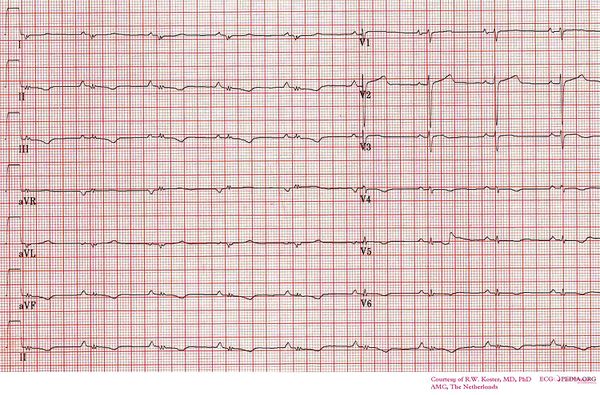Microvoltations: Difference between revisions
Jump to navigation
Jump to search
mNo edit summary |
No edit summary |
||
| Line 1: | Line 1: | ||
[[Image:microvoltages.jpg|thumb| | [[Image:microvoltages.jpg|thumb|Microvoltages. Note the normal amplitude of the p waves.]] | ||
[[Image:microvoltages002.jpg|thumb|Another example of (extreme) | [[Image:microvoltages002.jpg|thumb|Another example of (extreme) microvoltages.]] | ||
; | ;microvoltages: The QRS amplitute (i.e. the sum of the postive and negative parts) in the limb leads does not exceed 0.5 mV (5 mm) OR is no more than 1.0 mV (1 cm) in the chest leads. | ||
Possibe causes of | Possibe causes of microvoltages: | ||
* Cardiomyopathy, especially infiltrative cardiomyopathy, such as in [[w:Amyloidosis|amyloidosis]] | * Cardiomyopathy, especially infiltrative cardiomyopathy, such as in [[w:Amyloidosis|amyloidosis]] | ||
* Increased resistance between the heart and the electrodes: pneumothorax, obesesity, pericardial fluid / tamponade, pleural effusion | * Increased resistance between the heart and the electrodes: pneumothorax, obesesity, pericardial fluid / tamponade, pleural effusion | ||
Latest revision as of 22:29, 18 September 2007


- microvoltages
- The QRS amplitute (i.e. the sum of the postive and negative parts) in the limb leads does not exceed 0.5 mV (5 mm) OR is no more than 1.0 mV (1 cm) in the chest leads.
Possibe causes of microvoltages:
- Cardiomyopathy, especially infiltrative cardiomyopathy, such as in amyloidosis
- Increased resistance between the heart and the electrodes: pneumothorax, obesesity, pericardial fluid / tamponade, pleural effusion
- Myocarditis / pericarditis
- Heart tranplantation, especially during acute or chronic rejection
- Wrong settings on the ECG apparatus (sensitivity should be at 10 mm/mV)